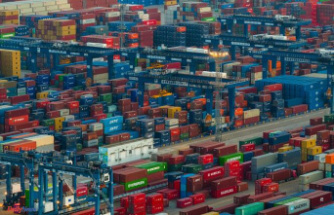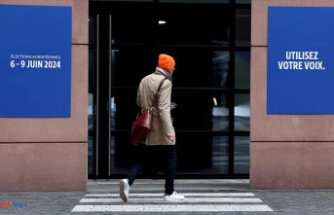The health food chain SuperBioMarkt takes refuge under a rescue package. The company from Münster, which currently has 900 employees and 33 branches, mainly in North Rhine-Westphalia and Lower Saxony, has applied for the opening of a so-called protective shield procedure - and has also been approved by the Münster District Court.
This special type of insolvency procedure is possible for companies that are threatened with over-indebtedness but are currently still liquid. In addition, there must be a positive continuation prognosis. Both were certified by SuperBioMarkt in a report.
The Westphalians, who have been on the market since 1973 and are therefore among the pioneers in the organic sector, are currently suffering from massive cost increases, for example for energy and rents, but also for the procurement of goods and raw materials, according to the company.
However, SuperBioMarkt was unable to pass on the higher costs to its own customers. Especially since the demand in the branches has already noticeably decreased. "Due to the consequences of Covid-19 and the Ukraine war, we felt a certain reluctance to buy," CEO Michael Radau told WELT.
“Even an organic market is in competition. Customers are willing to pay higher prices for high-quality goods, but of course there are limits. If the prices or price increases go above a certain limit, the sale of the product and thus the total turnover of the company automatically decreases.”
Now SuperBioMarkt has to draw up a restructuring plan within three months and then submit it to an insolvency judge. If it is accepted and then successfully implemented, the company is saved.
Otherwise there is a risk of classic insolvency proceedings. For the rescue and return to the black, the medium-sized company brought the restructuring expert Michael Mönig from the commercial law firm Mönig into the company as a general representative.
Business operations continue, reports CEO Radau. “The wages and salaries of the employees are secured. Those who work for us also get their money.” And the shelves in the shops also remain full.
"The suppliers support us and deliver their products as usual," assures Radau. "The protective shield procedure is very clear: All orders that we have placed after the initiation of the procedure must be paid." Old debts, on the other hand, cannot be enforced by creditors during the protective shield procedure.
However, not all branches will survive the forthcoming restructuring. "Unfortunately, it is already certain that we will have to close the branches in Aachen and in Düsseldorf on Friedrichstrasse," announced Radau.
No further closures are planned. "But at the moment we cannot completely rule out the possibility that we will still have to close a branch." The aim is to set up all locations in such a way that they generate profits. "And we see good chances that we will succeed."
The entrepreneur therefore does not consider it necessary for a new investor to get involved. The majority shareholder of the unlisted stock corporation SuperBioMarkt is Radau itself, further shares are held by Bio Development AG from Switzerland. "The shareholders continue to support the company."
It is quite possible that support will also be needed from other specialist retailers in the organic sector in the coming weeks and months. Due to inflation and high energy prices, the shopping behavior of customers is currently changing radically.
Organic is still in demand, as the Bund Ökologische Lebensmittelwirtschaft (BÖLW) recently reported on the sidelines of the world's largest industry trade fair, Biofach, in Nuremberg. "Organic remains stable - more stable than the food market as a whole," says Tina Andres, Chairwoman of the Board of the umbrella organization of German producers, processors and retailers of organic food. However, customers would now increasingly shop in discounters and supermarkets instead of in natural food stores.
Current data from market researcher GfK also shows this dynamic. In its consumer index in May, there is talk of a "trading down". What is meant by this is turning away from manufacturer brands and turning to cheaper private labels.
The organic sales development of the manufacturer brands in the first quarter of 2022 was minus 11.4 percent, while the sales of organic private labels increased by 9.3 percent in these three months.
GfK reports that organic remains highly relevant. “Organic has entered the mainstream and will not leave it again. Due to the price increases and household budget restrictions, the growth potential is currently on the side of the retail brands,” write the consumer researchers.
Not surprisingly, the large food retailers are reacting to consumer interest and are expanding their ranges accordingly. For this purpose, cooperations are also concluded with renowned cultivation associations such as Naturland, Demeter or Bioland.
The specialist trade, in turn, is under pressure. "The natural food trade is currently being enormously challenged by external developments such as inflation and the Ukraine war," reports Kathrin Jäckel, Managing Director of the German Association of Natural Foods and Natural Products (BNN). "The result is that healthy, medium-sized and regionally rooted companies can currently get into trouble."
Jäckel reports declining sales and sales volumes with rising costs for the organic specialists and is already appealing to consumers: "It is important to support the organic shops because they stand for variety in the food trade. It's the same with the small organic shops as with the small bookshops: if you want to keep them, you should also go shopping there.”
SuperBio market boss Radau also sees a key differentiator: “Organic is not always organic. In our SuperBioMarkets we strive for regional and highest quality products," says the entrepreneur, referring to "family structures at our manufacturers, farms and suppliers". As a rule, the discount store cannot offer this in this form.
In everyday shopping, however, the topic of price seems to be re-establishing itself as the most important purchase argument - unlike in the first two years of the corona pandemic. Michael Renz, head of the consumer goods and trade department at the economic consulting firm EY Germany, therefore sees further adversity for the industry.
"High-priced organic products are having a harder time with the current developments than before the pandemic," says the consultant. Because the price difference to standard products is sometimes very large. "Anyone who has to turn over every euro twice will think twice before reaching for an organic product."
BNN managing director Jäckel, however, disagrees. "It is currently not true that organic is always more expensive." The price differences between conventional and organic food have narrowed significantly in recent weeks.
In certain areas, such as milk and butter, conventional products are sometimes more expensive than organic food. "And we expect the gap to continue to narrow over the coming weeks."
According to current figures, sales in the organic sector in Germany were on average 15 percent lower in the first half of the year than in the first six months of 2021. Nevertheless, the revenues exceed the pre-corona level of 2019 by at least 35 percent, as reported by the BÖLW. The association points out that this shows a change in awareness towards more organic. "The boom of the years 2020 and 2021 will not be reached at the moment."
"Everything on shares" is the daily stock exchange shot from the WELT business editorial team. Every morning from 7 a.m. with the financial journalists from WELT. For stock market experts and beginners. Subscribe to the podcast on Spotify, Apple Podcast, Amazon Music and Deezer. Or directly via RSS feed.












